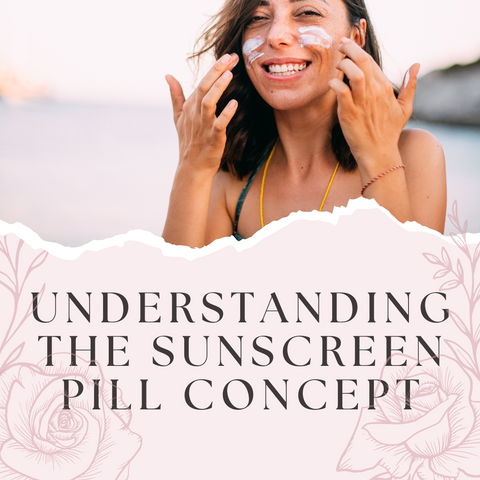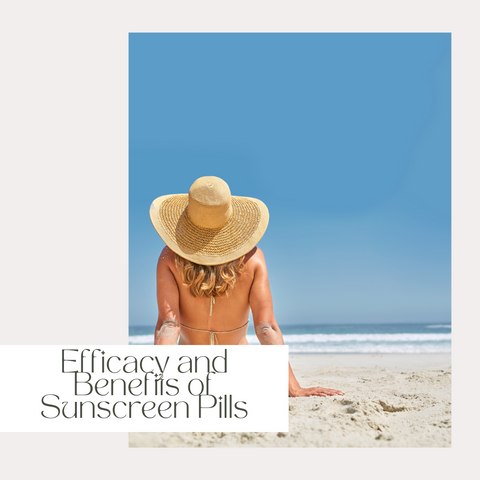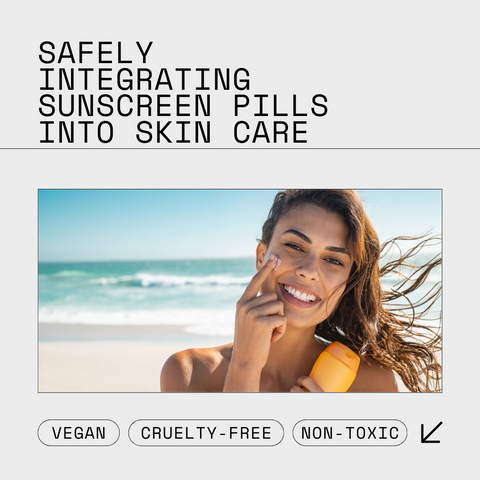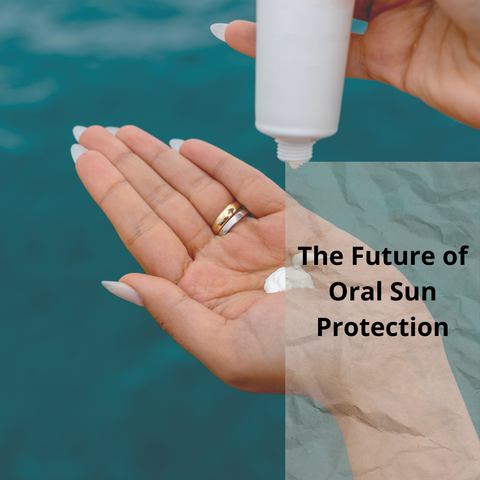The aim behind a sunscreen pill is to eat a chemical that can guard against the detrimental effects of ultraviolet (UV) radiation from the sun. UV radiation is a key cause of skin cancer and premature skin ageing. Polypodium leucotomos, an extract from a tropical fern, is one of the compounds being researched for its potential UV radiation protection. Some research suggests that it may have antioxidant and anti-inflammatory effects, which could help protect the skin from UV radiation damage. While research in this area is ongoing, no pill or supplement should be considered a replacement for traditional sun protection measures such as wearing sunscreen, protective clothing, and seeking shade. If sunscreen pills become available in the future, they will most likely be used as an additional layer of protection rather than as a stand-alone solution.
Understanding the Sunscreen Pill Concept

The goal behind a "sunscreen pill" is to create a tablet or supplement that can guard against the detrimental effects of ultraviolet (UV) radiation from the sun. UV radiation is a primary cause of skin cancer and can also lead to premature skin ageing. UV radiation and skin damage, traditional sunscreen, sunscreen pill ingredients, polypodium leucotomos, limitations and precautions, and regulatory approval are some major points related to the sunscreen pill concept. Before attempting any new method of sun protection or skin health, it is critical to stay current on the newest research in this field and to speak with healthcare professionals.
How Sunscreen Pills Work
The concept of "sunscreen pills" is still under investigation, and no generally acknowledged and regulated sunscreen tablet is available. We can, however, share information on how researchers have investigated the potential methods by which some compounds, such as polypodium leucotomos, can protect against UV radiation. Keep in mind that developments in this sector may have occurred.
Key Ingredients in Sunscreen Pills
The concept of "sunscreen pills" was still under investigation, and no generally acknowledged or regulated sunscreen pill was available. However, researchers were looking into several compounds that might have photoprotective qualities. Polypodium leucotomos, an extract from a tropical fern, is one of the substances that has garnered attention in this context.
-
Polypodium Leucotomos: Polypodium leucotomos is a fern found in Central and South America. Some research suggests that taking polypodium leucotomos extract orally may Provide photoprotection against the detrimental effects of UV radiation. The extract is said to contain antioxidant qualities, which aid in the neutralisation of free radicals produced by UV radiation. It may potentially have anti-inflammatory properties.
-
Astaxanthin: Astaxanthin is a carotenoid, a type of pigment that gives certain shellfish and algae their red or pink colour. It is a powerful antioxidant that has been examined for its possible involvement in skin health and UV protection.
-
Vitamin E: Vitamin E is an antioxidant-rich fat-soluble vitamin. It is commonly found in skincare and supplements, and its antioxidant properties may help protect the skin from oxidative damage caused by UV radiation.
-
Beta-Carotene: Beta-carotene is a vitamin A precursor found in orange and yellow pigmented fruits and vegetables. It contains antioxidants and is thought to benefit skin health.
-
Lycopene: Lycopene is a red pigment found in fruits and vegetables such as tomatoes and watermelons. It is well-known for its antioxidant properties and has been studied for its potential role in UV skin protection.
It is worth noting that, while these ingredients have been studied for their potential photoprotective effects, research is ongoing, and the effectiveness of sunscreen pills is still up for debate. Furthermore, regulatory approval of such products is an important consideration.
Comparing Oral Sun Protection to Topical Methods
Oral sun protection, typically associated with "sunscreen pills" or supplements, is currently under investigation and has not been extensively adopted as a replacement for traditional topical techniques. Here's a comparison of oral and topical sun protection methods:
-
Mechanism of Action: Traditional sunscreens absorb, reflect, or scatter UV light by forming a physical or chemical barrier on the skin. They have a localised effect on the skin's surface and give instant protection upon application. Oral supplements containing substances such as polypodium leucotomos, astaxanthin, or other antioxidants are intended to provide internal protection. These supplements are consumed, and the mechanisms claimed include antioxidant benefits, anti-inflammatory characteristics, and potential DNA repair improvement.
-
Application and Use: Sunscreen lotions, creams, sprays, and sticks are applied to the skin directly. After swimming, sweating, or prolonged sun exposure, reapplication is usually required. Supplements are usually taken orally in the form of a tablet or capsule. It may be necessary to take them daily, and their effectiveness may take time.
-
Comprehensive Protection: Traditional sunscreens provide broad-spectrum UVA and UVB radiation protection. They are effective for targeted protection since they may be applied to specific places. The effectiveness of oral supplements varies, and they are frequently regarded as supplemental protection rather than a stand-alone solution. They may provide systemic benefits by protecting the entire skin surface.
-
Regulatory Approval: To assure safety and efficacy, sunscreen products are controlled by health bodies (such as the FDA in the United States). They are subjected to rigorous testing to establish their sun protection qualities. There was no broad regulatory approval for the use of oral sunscreen tablets as a primary means of sun protection. Oral sun protection products may have a different regulatory process than topical sunscreens.
-
Considerations and Limitations: Topical sunscreens are easy to use, generally available, and may be included in everyday skincare routines. Certain sunscreen chemicals may cause skin sensitivity or reactions in some people. Oral supplements are currently being studied for their efficacy, and their use may not be as well-established or understood as topical sunscreens. Individuals should exercise caution when relying entirely on oral techniques and should continue to engage in other sun-safe practises.
While the concept of oral sun protection is intriguing, traditional topical techniques of UV radiation protection remain the major and well-established means of protecting the skin. Oral sun protection research is ongoing, and advances may come in the future. Individuals should remain aware, consult healthcare specialists, and continue to practise tried-and-true sun protection strategies such as sunscreen, protective clothing, and seeking shade.
Efficacy and Benefits of Sunscreen Pills

Sunscreen pill efficacy and benefits were still being studied, and no widely acknowledged sunscreen pill had been established as a primary form of sun protection. It's worth noting that changes in the field may have occurred since then. Here are some things to think about when it comes to the potential efficacy and benefits of sunscreen pills:
-
Antioxidant and Anti-Inflammatory Effects: Many sunscreen pills contain antioxidant substances such polypodium leucotomos, astaxanthin, beta-carotene, and vitamin E. Antioxidants may aid in the neutralisation of free radicals produced by UV radiation, potentially lowering oxidative stress and inflammation in the skin.
-
Potential Systemic Photoprotection: The goal behind sunscreen pills is to provide internal, systemic protection against the detrimental effects of UV radiation. Some supporters argue that these supplements may provide more extensive coverage than topical sunscreens, perhaps protecting the entire skin surface.
-
Convenience and Daily Use: Sunscreen pills are an alternative to topical sunscreens and may be more convenient for people who find it difficult to apply lotions or creams daily. Daily oral ingestion of sunscreen pills could be incorporated into a daily routine, eliminating the need for frequent reapplication.
-
DNA Repair Enhancement: Some studies have explored the idea that certain ingredients in sunscreen pills might enhance DNA repair mechanisms in response to UV-induced damage.
-
Skin Health and Anti-Aging Benefits: Antioxidants, which are frequent sunscreen chemicals, are also known for their potential benefits in supporting overall skin health and preventing premature ageing.
However, it is critical to consider the following:
-
Limited Regulatory Approval: Sunscreen pills were not commonly accepted as a primary source of sun protection by regulatory authorities such as the United States Food and Drug Administration (FDA). Consumers should proceed with caution and double-check the regulatory status of any product claiming to provide sun protection.
-
Varied Results in Studies: The efficacy of sunscreen pills has been studied, however, the level of protection provided may differ between individuals. The scientific community is still researching the best formulations and ingredients for efficient oral sun protection.
-
Not a Replacement for Traditional Sunscreen: Sunscreen pills, if widely available, are generally regarded as a supplement to, rather than a replacement for, established sun protection measures. As part of a comprehensive sun protection approach, individuals are still encouraged to use topical sunscreens, wear protective clothes, and seek shade.
Individuals should check with healthcare professionals and stay up to date on the newest studies in the field before using sunscreen tablets. Sun protection is still a comprehensive approach, and new products' efficacy and safety should be properly examined.
Sunscreen Pills in Skin Cancer Prevention
The use of sunscreen pills in the prevention of skin cancer is currently being researched and debated. While some research has been conducted to investigate the possible benefits of some oral supplements in protecting the skin from the damaging effects of ultraviolet (UV) radiation, no generally approved sunscreen pill has been created as a primary means of avoiding skin cancer. The following are important concerns for sunscreen pills in the context of skin cancer prevention:
-
UV Radiation and Skin Cancer: Prolonged sun exposure is a key risk factor for the development of skin cancer, including both non-melanoma and melanoma kinds.
-
Sunscreen Pills and Ingredients: Some oral supplements have been researched for their potential to provide photoprotective effects, including those containing substances such as polypodium leucotomos, astaxanthin, and antioxidants.
-
Antioxidant and Anti-Inflammatory Properties: Sunscreen pill ingredients may have antioxidant qualities, which aid in the neutralisation of free radicals produced by UV radiation. Anti-inflammatory properties may also help to reduce skin inflammation induced by sun exposure.
-
DNA Repair Enhancement: Some studies have looked into whether particular ingredients in sunscreen pills could improve DNA repair mechanisms, potentially lowering the chance of DNA damage leading to skin cancer.
-
Complementary Approach: Sunscreen pills, if proven effective, are generally regarded as a supplement to traditional sun protection measures rather than a replacement. They can be combined with topical sunscreens, protective clothing, and other sun safety measures.
-
Regulatory Status: Sunscreen tablets received limited regulatory approval as a primary form of sun protection. Products that make sun protection claims should be subjected to rigorous testing and approval by regulatory organisations.
-
Clinical Evidence and Further Research: The currently available clinical evidence on the efficacy of sunscreen tablets is inconclusive, and study is underway. Future research is needed to better understand the best formulations, doses, and long-term effects of oral supplements in skin cancer prevention.
The Role of Antioxidants in UV Protection
Antioxidants play an important function in UV protection by helping to reduce the damaging effects of UV radiation on the skin. UV radiation, particularly UVA and UVB rays, can cause oxidative stress in the skin, resulting in the generation of free radicals. Free radicals are highly reactive chemicals that have the potential to destroy biological components such as DNA, proteins, and lipids. This oxidative damage accelerates skin ageing and raises the risk of skin cancer. Antioxidants provide UV protection by neutralising free radicals, lowering oxidative stress, preserving cellular components, having anti-inflammatory properties, and increasing the skin's natural defence.
Common antioxidants with known UV-protective roles include:
-
Vitamin C (Ascorbic Acid): Known for its antioxidant properties, vitamin C aids in the neutralisation of free radicals and the synthesis of collagen.
-
Tocopherol (Vitamin E): A fat-soluble antioxidant that protects cell membranes and lipids from oxidative stress.
-
Beta-Carotene: Beta-carotene, a precursor to vitamin A, has antioxidant properties and may benefit skin health.
-
Selenium: A necessary mineral that functions as an antioxidant enzyme to help scavenge free radicals.
-
Flavonoids: Flavonoids, which are found in plants, have antioxidant and anti-inflammatory properties.
While antioxidants can provide beneficial protection, they should not be used in place of other sun protection measures. UV protection requires the use of broad-spectrum sunscreen, protective clothing, and seeking shade. When incorporated into skincare products, topical antioxidants can supplement these efforts and contribute to overall skin health. A healthy diet rich in antioxidants from fruits and vegetables can also help protect the skin from the inside out.
Clinical Research on Sunscreen Pill Effectiveness
The effectiveness of sunscreen tablets, often known as oral sun protection supplements, was being studied. It's worth noting that progress and additional studies may have been released since then. The scientific community did not widely recognise sunscreen tablets as an important means of sun protection, and the research landscape was marked by mixed results. Here are some major points from clinical research on the effectiveness of sunscreen pills:
-
Polypodium Leucotomos: Polypodium leucotomos, a tropical fern extract, has been studied for its potential photoprotective properties. Some clinical studies have suggested that taking polypodium leucotomos orally may provide some protection against UV radiation.
-
Astaxanthin: Astaxanthin, a carotenoid found in algae and shellfish, is an antioxidant. Clinical studies have looked into the role of astaxanthin supplementation in promoting skin health and protecting against UV damage.
-
Beta-Carotene: Beta-carotene, a precursor to vitamin A and an antioxidant, has been studied for its possible function in enhancing skin health and providing some sun protection.
-
Mixed Results and Varied Formulations: Some studies have found that specific oral supplements can help reduce UV-induced skin damage, while others have found more limited efficacy. The effectiveness of sunscreen pills may be affected by factors like as formulation, dose, and supplementation length.
-
Complementary Approach: Sunscreen tablets, according to research, should be seen as a supplement to established sun protection strategies such as the use of topical sunscreen, protective clothing, and seeking shade.
-
Regulatory Considerations: Sunscreen tablets had not been approved as a replacement for traditional sunscreens by regulatory authorities such as the United States Food and Drug Administration (FDA). Sun protection claims on products are subject to regulatory investigation.
-
Need for Further Research: The scientific community has called for more well-designed and controlled studies to better understand the efficacy, safety, and optimal use of sunscreen pills.
Given the fluid nature of scientific research, it is prudent to seek out the most recent literature on sunscreen pill effectiveness. Always consult with a healthcare professional before attempting any new approach to sun protection, and rely on evidence-based practises for overall skin health and UV radiation protection.
Safely Integrating Sunscreen Pills into Skin Care

The concept of sunscreen tablets was still under investigation, and no generally acknowledged or regulated sunscreen pill was available. If significant discoveries have occurred since then, it is important to rely on scientific and regulatory knowledge. The following are some general considerations for incorporating any potential sunscreen tablets into your skincare routine safely:
-
Consult with Healthcare Professionals: Consult with a healthcare expert before using any new supplement or medication, especially ones touting sun protection benefits. They can give you tailored advise based on your health, medical history, and unique skincare requirements.
-
Understand the Ingredients: If a sunscreen tablet becomes available, thoroughly read and comprehend the component list. Keep an eye out for potential allergies or interactions with other medications you're taking.
-
Complement with Traditional Sun Protection: If sunscreen pills become available, they are generally seen as a supplement to, rather than a replacement for, standard sun protection techniques. As part of a comprehensive sun protection approach, continue to use broad-spectrum sunscreen, protective clothing, and seek shade.
-
Follow Recommended Dosages: If there are recommended dosages for the sunscreen pill, follow them exactly. Unless otherwise directed by a healthcare practitioner, do not exceed suggested doses.
-
Monitor for Side Effects: Take note of any side effects or unpleasant reactions. If you notice any strange symptoms, stop using the product and consult a doctor.
-
Be Cautious with Claims: Exaggerated promises about the effectiveness of sunscreen tablets should be avoided. Make certain that any product that makes sun protection claims has undergone extensive testing and regulatory certification.
-
Consider Your Skin Type and Sensitivity: People with sensitive skin or skin disorders may react differently to skincare products, including supplements. Consider your skin type as well as any existing skin issues.
-
Include a Comprehensive Skincare Routine: Sun protection is only one component of skincare. Maintain a thorough skincare routine that includes washing, moisturising, and addressing specific skin issues.
Guidelines for Using Sunscreen Pills
The use of sunscreen tablets was still under investigation, and there were no universally acknowledged guidelines. Consult with healthcare professionals, follow recommended dosages, supplement with traditional sun protection, understand the ingredients, monitor for side effects, be cautious with claims, consider your skin type and sensitivity, include a comprehensive skincare routine, stay informed, and pregnancy and lactation are some general considerations that may be relevant if sunscreen pills become widely accepted and regulated. It is critical to follow the most recent guidelines and suggestions from healthcare professionals and regulatory agencies when using sunscreen tablets.
Complementing Sunscreen Pills with Topical Sunscreens
If sunscreen tablets become widely accepted and regulated as a type of sun protection, it is vital to note that they are generally seen as a supplement to existing topical sunscreens, not a replacement. Both approaches can be used together to provide a more comprehensive strategy for protecting the skin from the harmful effects of ultraviolet (UV) radiation. Understand the role of each, follow recommended dosages and application guidelines, choose a broad-spectrum topical sunscreen, apply topical sunscreen to exposed areas, reapply topical sunscreen, seek shade and wear protective clothing, stay informed and consult with professionals, consider specific sunscreen needs, be consistent, and consider pregnancy and lactation.
Considerations for Long-Term Use
The concept of sunscreen pills was still an area of research, and their long-term effects may not have been extensively studied. If there have been new developments since then, it's important to rely on the latest scientific and regulatory information. Some general considerations for the long-term use of skincare products, including potential sunscreen pills, include consulting with healthcare professionals about regulatory approval and safety, ingredient safety, and allergies; monitoring for side effects; hydration and moisturization; sun protection beyond pills; reassessing skincare needs, pregnancy and lactation, sun safety, and skin cancer prevention; and staying informed. Always follow the most recent guidelines and suggestions from healthcare professionals and regulatory agencies.
The Future of Oral Sun Protection

The future of oral sun protection, including the development and acceptability of sunscreen pills, remained a work in progress. Advances in technology, scientific understanding, and regulatory approval processes may all have an impact on the future of oral sun protection. Research and development, ingredient innovation, clinical trials and evidence-based practises, regulatory approval and standardisation, consumer education, integration with traditional sun protection, dermatologist and healthcare professional guidance, and technological advances are some potential aspects of the future of oral sun protection. It is critical to keep up with the most recent research findings and regulatory advancements in the field of oral sun protection. Individuals interested in researching oral sun protection alternatives should get the latest advice and suggestions from healthcare specialists.
Innovations and Trends in Sun Protection
In the field of sun protection, several innovations and trends were emerging. Keep in mind that things may have changed since then. Advanced formulas, mineral-based sunscreens, inclusive sunscreens, eco-friendly sunscreens, sunscreens with antioxidants, biodegradable and sustainable packaging, sunscreen products that can be consumed, customised sun protection, water-resistant and sport-specific sunscreens, technological advancements, digital tools for sun safety, and combination products are some noteworthy innovations and trends in sun protection. The efficiency of any sunscreen product depends on the correct application and following usage instructions; it is vital to remember that. People should also keep up with the most recent findings in the field, seek advice from dermatologists or skincare specialists, and adhere to recommended practises for sun protection, such as finding shade and dressing in protective gear.
Emerging Research and Developments
Skincare research and development, particularly sun protection, were active fields. Because advances in science and technology can happen quickly, it's best to consult the most recent literature and knowledge. Advanced sunscreen technologies, biomedical approaches to sun protection, genetic factors and sun sensitivity, antioxidant protection innovations, nanotechnology in sunscreen, biodegradable and sustainable sunscreen ingredients, photoprotection from ingestible compounds, skin microbiome and sun protection, customised skincare solutions, digital technologies for sun safety, and regulatory changes abound. It is important to study these advances by reading credible scientific journals, industry publications, and regulatory authorities. Additionally, consulting with dermatologists and skincare professionals can provide insights into the most recent advancements and guide individuals in making informed choices for their skincare routines.
















